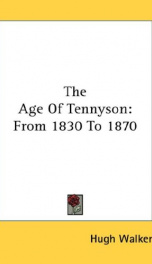the greater victorian poets

Purchase of this book includes free trial access to www.million-books.com where you can read more than a million books for free. This is an OCR edition with typos. Excerpt from book: CHAPTER III. BROWNING: 1833 To 1846. While Tennyson was slowly perfecting himself and spending his strength as much in the revision of his youthful work as in the production of new pieces, Browning was producing verse with that rapidity which always distinguished him. The whole of Tennyson's verse between 1830 and 1842 (all, that is, which he permanently retained) in Macmillan's edition of 1888 fills only part of two very moderate-sized volumes. But between 1833 and 1846 Browning published eleven long poems and over forty shorter pieces. This ratio of productiveness was characteristic of the two men, though the difference in later years was not so great. It is also characteristic that while Tennyson laboriously revised and touched up his poems, Browning made few changes. He seems indeedto judge from the preface to Paulineto have held peculiar notions as to the ethics of the relation between an author and his readers. In the first reprint he corrected only errors of the press, holding it "the honest course" to "leave mere literary errors unaltered". Pauline bears throughout the marks of youth, but it is a youth of splendid promise. It is all the more imperative to recognise its merits because of Browning's own exaggerated, though doubtless quite sincere, depreciation. The poem is defective in construction and hazy in outline. It shows little of that intimate and masterly knowledge of human passion which the author's mature works display. He seems to be labouring at a work too great for him, while he shows by strokes here and there that he may some day be great enough for any work. But though its defects are grave they are redeemed by many fine passages, some of them beautiful with a luxuriant beauty not common in Browning's subsequent works. It is moreover always instruc...
Info about the book
Author:
Series:
Unknown
ISBN:
1429791241
Rating:
3.5/5 (4)Your rating:
0/5
Languge:
English
Users who have this book
Users who want this book
What readers are saying
What do you think? Write your own comment on this book!
write a commentif you like the greater victorian poets try:
Do you want to read a book that interests you? It’s EASY!
Create an account and send a request for reading to other users on the Webpage of the book!




